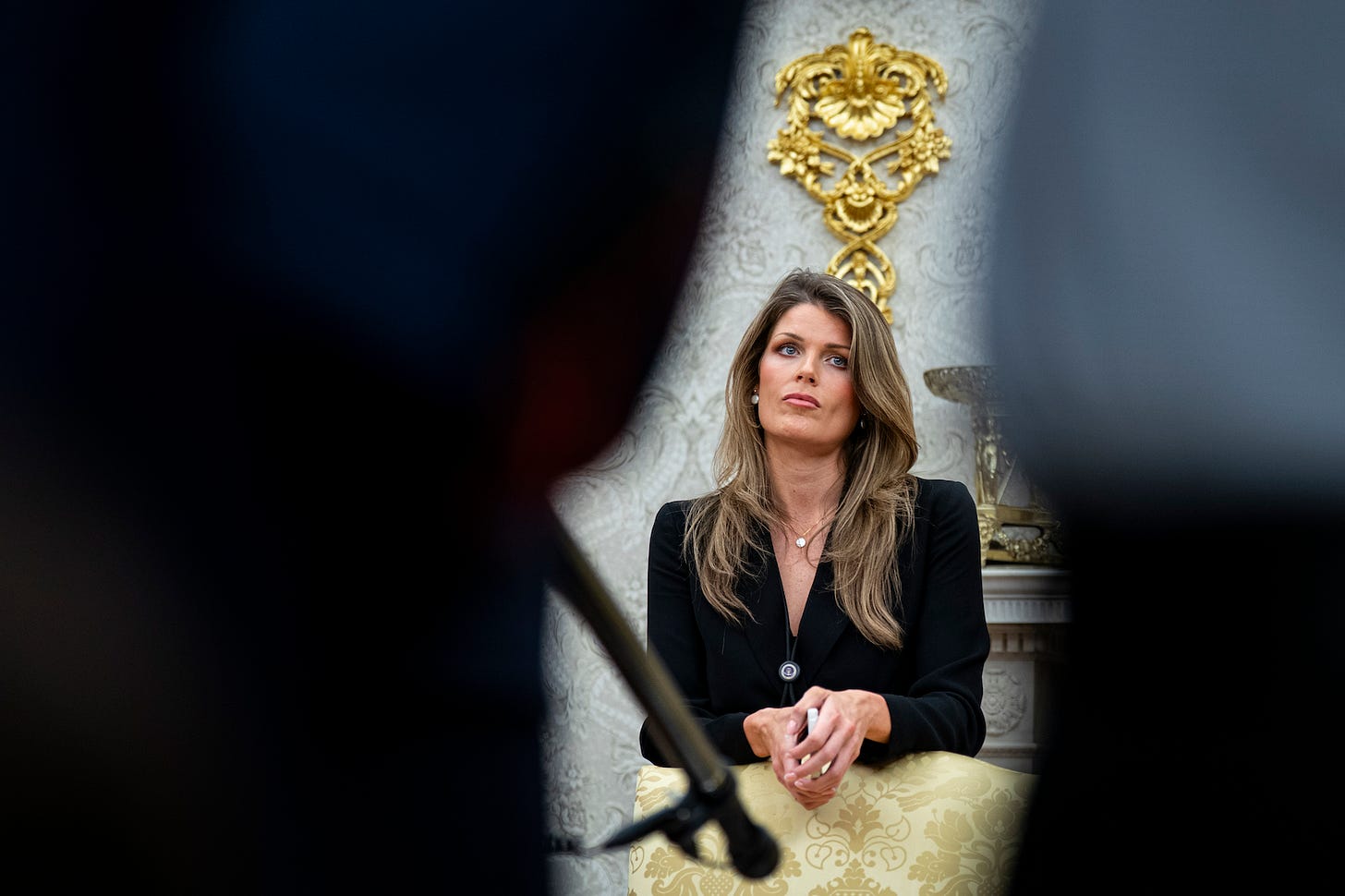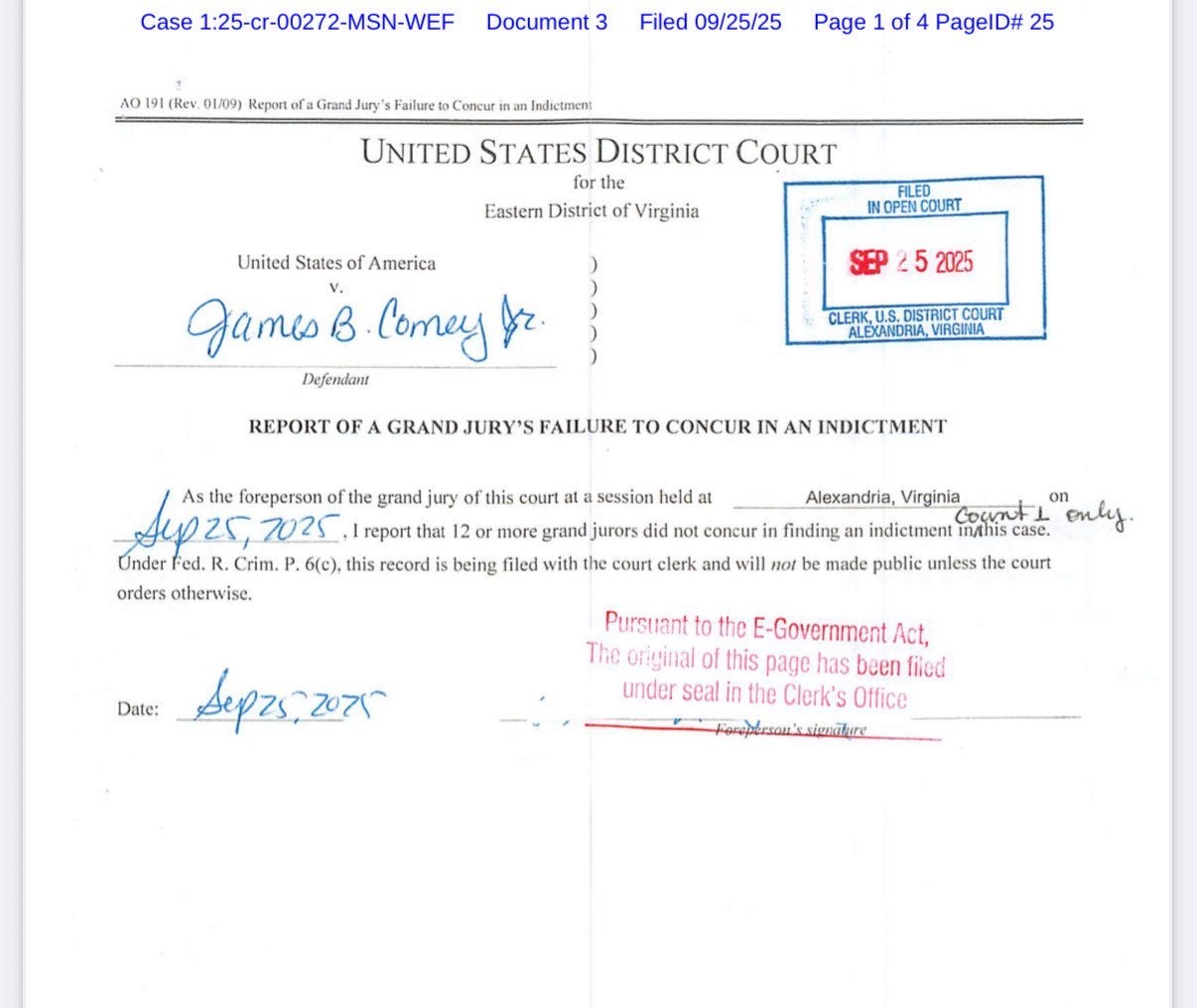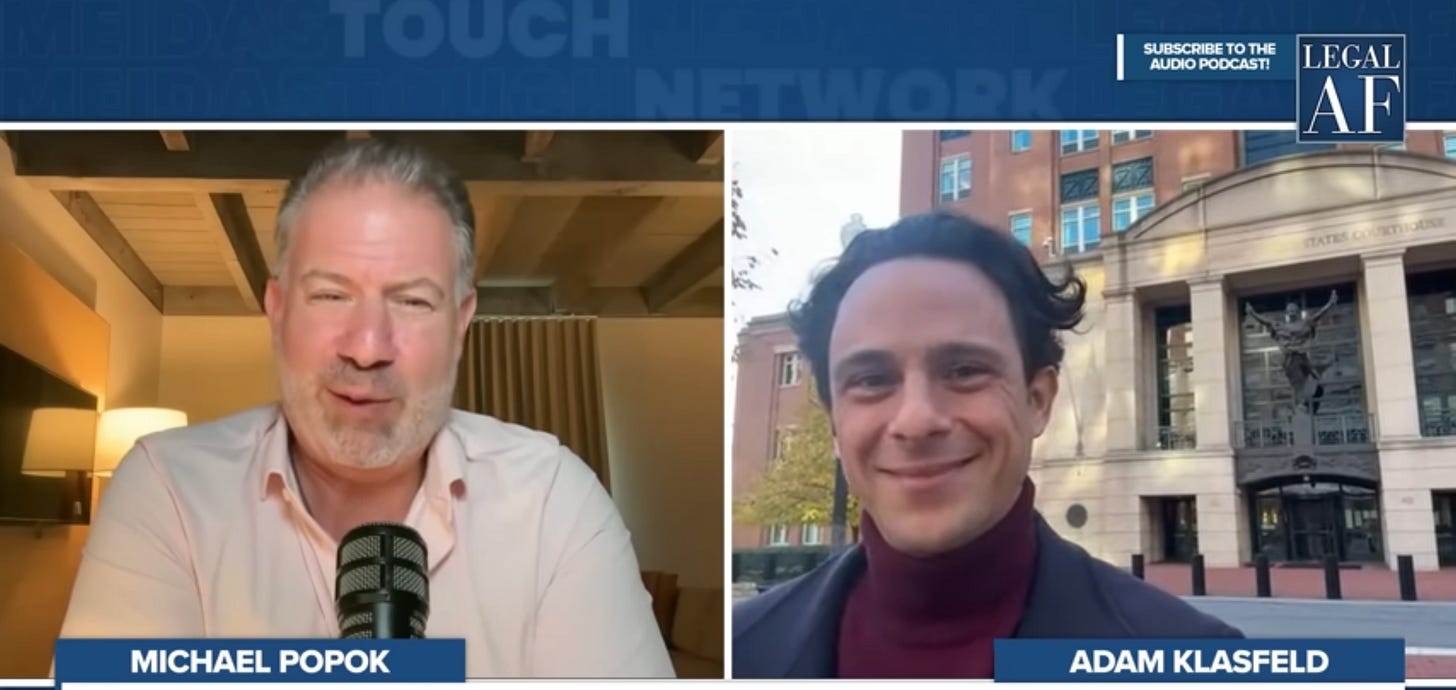'You may sit down': James Comey's prosecutor under fire
Inside the brief exchange compounding rookie prosecutor Lindsey Halligan's woes in the Comey case
Stay tuned for live coverage of a hearing to determine whether the U.S. government can deport Kilmar Abrego Garcia to Liberia.
During nearly every pretrial hearing in the James Comey case, Donald Trump’s former personal lawyer turned rookie prosecutor Lindsey Halligan remained virtually silent in court.
At Comey’s arraignment, Halligan uttered only two words: her name. As Lawrence O’Donnell memorably put it, she got that wrong. She forgot to register her appearance for the record by adding that she (purportedly) represented the United States. Comey’s pending motion will decide whether she, in effect, has been appearing in court as a private citizen.
Since that time, Halligan avoided repeating that mistake by having her assistants note her appearances in court for her. She was on track for another wordless appearance at the prosecution table until U.S. District Judge Michael Nachmanoff prompted her to explain whether the full grand jury actually saw Comey’s final indictment.
The transcript reflects Halligan’s hesitancy and anxiety during the brief exchange. She interrupts the judge about his interpretation before admitting what she couldn’t deny:
THE COURT: You can. Ms. Halligan, you can come to the podium. You’re counsel of record. You can address the Court. It might be easier. Good morning.
MS. HALLIGAN: Good morning.
THE COURT: So am I correct that, as is the usual —
MS. HALLIGAN: No, your honor.
THE COURT: — practice, that the grand jurors were not present, just the foreperson?
MS. HALLIGAN: The foreperson and another grand juror was also present, and Judge Vaala corrected the record in open court, and the foreperson said in open court, ‘We only no true billed Count One. We want to true bill Count Two and Three,’ and the foreperson signed that indictment.
THE COURT: I’m familiar with the transcript.
MS. HALLIGAN: Okay.
THE COURT: But I just wanted to make sure that the entire grand jury never had the opportunity to see the second indictment. You may sit down. Thank you.
“A couple more questions”
Before that moment, Judge Nachmanoff grilled her assistant Tyler Lemons about what happened during the more than two-hour gap in the grand jury transcript. After a series of questions about Comey’s vindictive prosecution motion, the judge sharply pivoted.
“Well,” the judge said.
He took a pregnant pause before adding: “I have a couple more questions before you sit down.”
Watch my appearance on Laura Coates Live below:
Nachmanoff began his inquisition by joining the growing list of judges questioning whether Trump’s Justice Department is entitled to the presumption of regularity, once routinely granted to the government.
“At the beginning of your remarks, you said that the grand jury had returned an indictment and there’s a presumption of regularity with what happened, but as we know from other litigation in this case, there have been some questions and some attempts to resolve those issues,” Nachmanoff said.
The outlet Just Security has catalogued at least 58 instances in which federal judges found Trump’s government took “arbitrary and capricious” actions and numerous findings that the presumption of regularity had been “forfeited.”
Comey’s grand jury transcript is silent between 4:28 p.m. and 6:40 p.m. Eastern Time on Sept. 25.
Halligan insisted in a court declaration that the panel deliberated throughout that time without interacting with government lawyers, but Nachmanoff noted that there were two versions of the indictment.
Signed in blue ink, the first version reported that the grand jurors “did not concur in finding an indictment in this case.” A hand-drawn notation in black indicated that the no-bill was as to “Count 1 only.”
Under heavy questioning by the judge, Lemons said that “no government personnel appeared in front of the grand jury again” after deliberations began. The prosecutor’s explanation veers into passive voice frequently from there. Halligan “was informed by another person in the [U.S. Attorney’s] office” about the first indictment, and she “was handed” a revision.”
Cutting to the chase, Nachmanoff asked Lemons whether he was saying that “someone in the U.S. Attorney’s Office drafted a new indictment, but that new indictment was never presented to the entire grand jury in the grand jury room.”
Lemons conferred privately with Halligan before conceding, rather circuitously, that this was true.
Nachmanoff repeated: “Let me be clear that the second indictment, the operative indictment in this case that Mr. Comey faces, is a document that was never shown to the entire grand jury or presented in the grand jury room; is that correct?”
“Standing here in front of you, your honor: Yes, that is my understanding,” Lemons confirmed.
Halligan’s confirmation fell shortly after that.
“A stalking horse or puppet”
The fallout of the admission remains to be seen: Judge Nachmanoff asked the parties to brief appellate court precedent of a case, Gaither v. United States, where an indictment survived a similar grand jury discrepancy.
But Nachmanoff appeared taken aback by the revelation, which raises the question about whether Comey is under federal indictment at all.
“Briefly on the colloquy that you had with counsel on the indictment, it appears that counsel is acknowledging that the operative indictment in this case was never shown to the grand jury and that there is no indictment that Mr. Comey is facing that was returned before the elapse of the statute of limitations,” Comey’s lawyer Michael Dreeben said.
The Justice Department, for its part, is preparing for the worst — with a misleading personal attack against Nachmanoff, over the judge’s eyebrow-raising exchange with Comey’s attorney.
“So your view is that Ms. Halligan is a stalking horse or a puppet, for want of a better word, doing the president’s bidding?” Nachmanoff said, referring to the basis of Comey’s vindictive prosecution motion.
“Well, I don’t want to use language about Ms. Halligan that suggests anything other than she did what she was told to do,” Dreeben said, diplomatically.
Halligan, who was in court to hear the accurate exchange, told reporters: “Personal attacks — like Judge Nachmanoff referring to me as a ‘puppet’ — don’t change the facts or the law.”
Nachmanoff said that he would take the matter “under advisement,” calling the matters “too weighty and too complex” for a ruling from the bench. It remains to be seen whether the case will survive a motion to disqualify Halligan that U.S. District Judge Cameron Currie indicated she would rule on before Thanksgiving.






I’m almost tempted to feel sympathy for Halligan. She’s clearly in way over her head. But she had an option when Bondi asked her to take the post. She could have said no.
The judge’s name sounds like “Knock it off”, which is exactly what he deserves to say to the prosecution at this point…